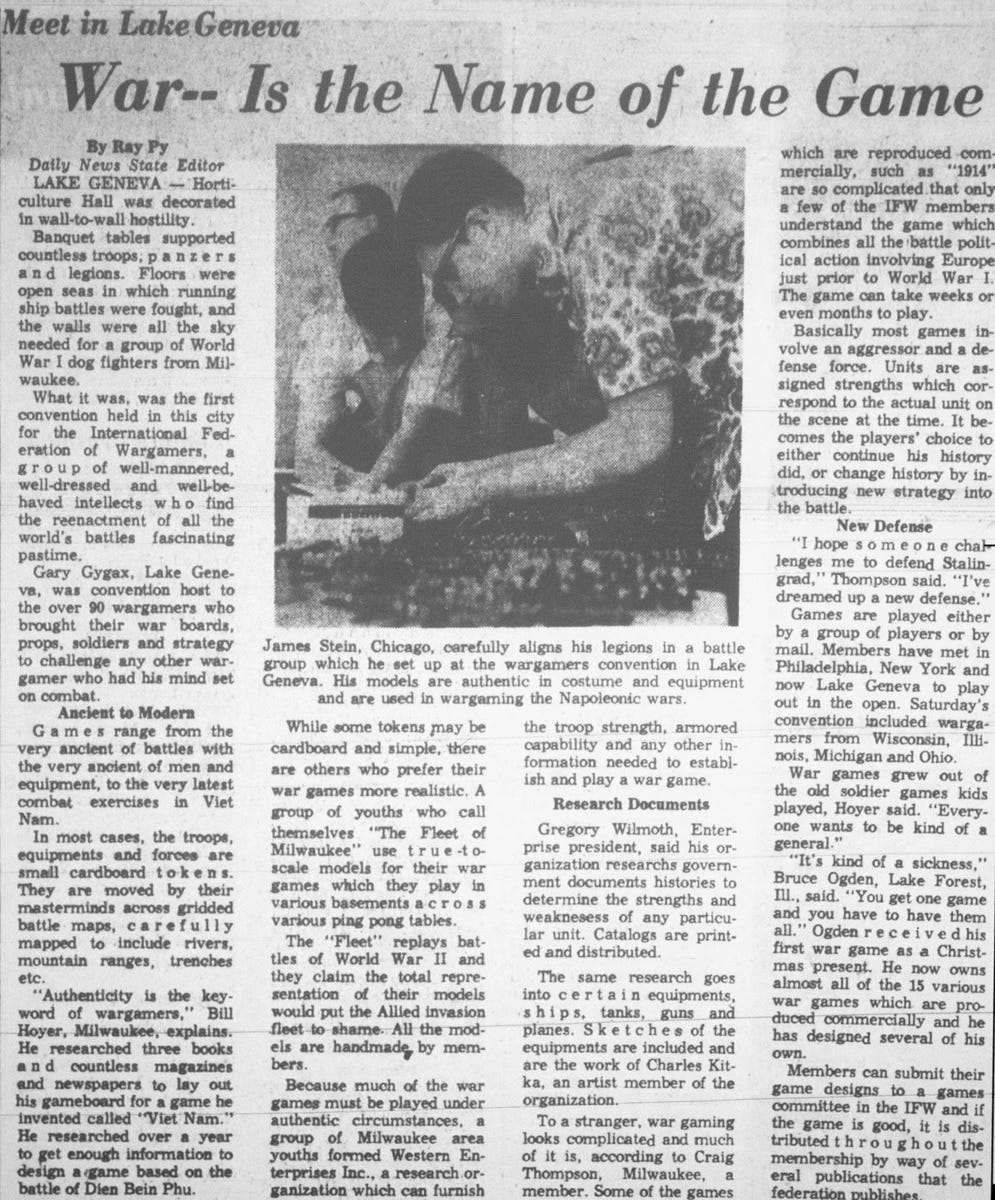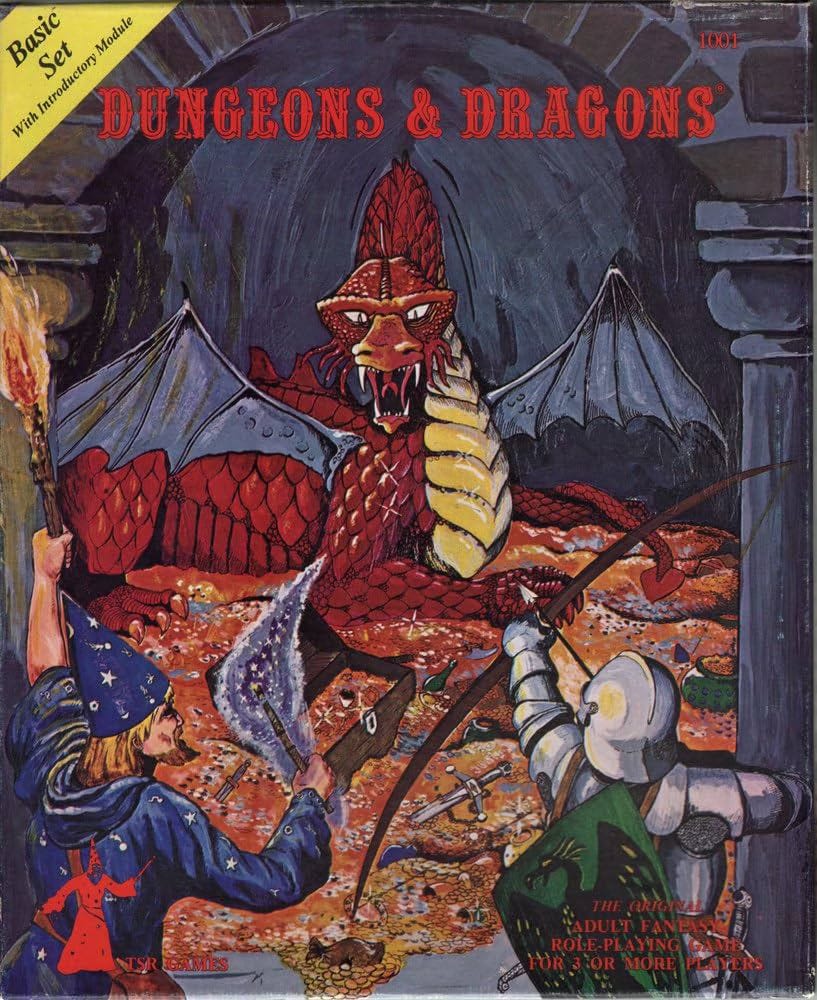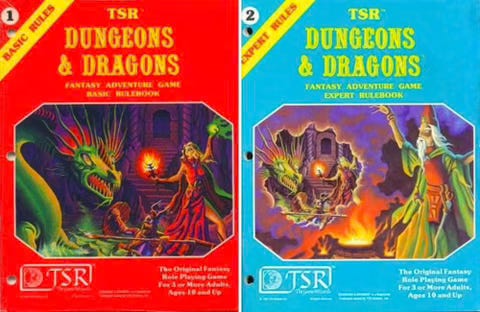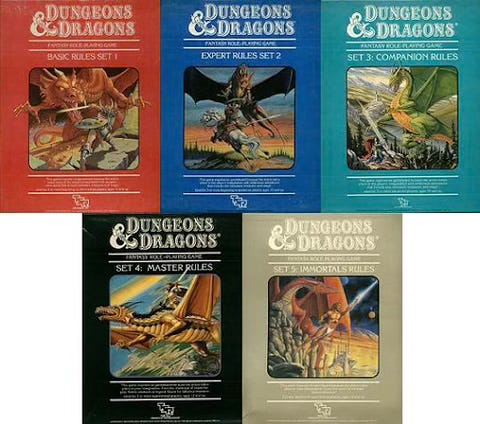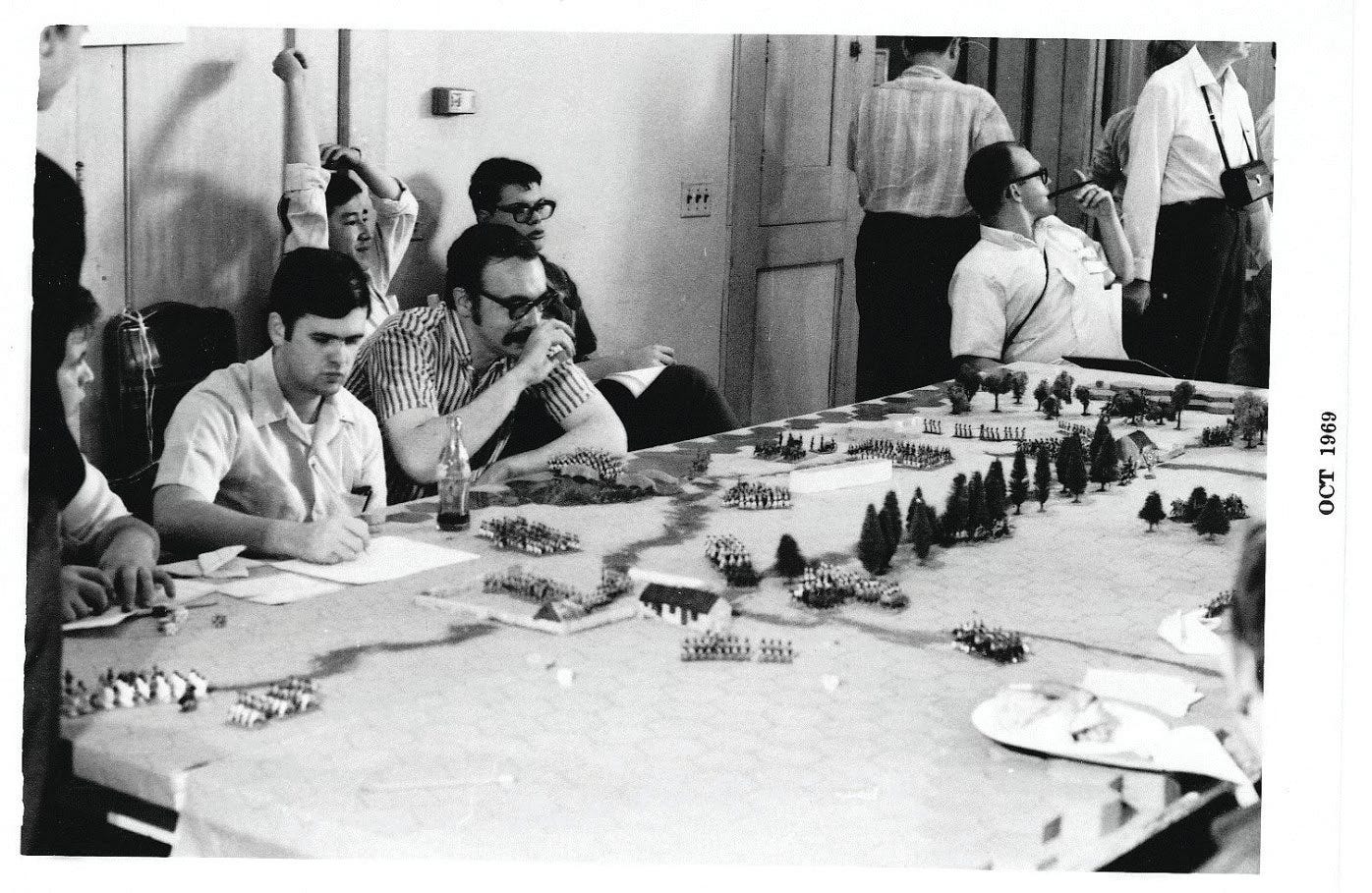Basic is When D&D Changed, not AD&D
Or, B/X is a Terrible Game and I'm Tired of Pretending It's Not
The lingua franca of the OSR is the much lauded D&D Basic and Expert Set, designed by Tom Moldvay and David Cook and released in 1981. According to its proponents, Basic is the continuation of OD&D; A nice and simple, rules lite system that relies heavily on Rule 0 and DM improv to run smoothly. Quite unlike the monstrous AD&D, which was an amalgamation of coke-fueled insanity that no one ever actually played. Most of those rules were useless! Who needs the odds of a galleon sinking in inclement weather? That's totally overkill. Just let the players try to save the ship and if they fail it sinks. If you need, set some random odds and roll a die. Nice and simple, that's why it's called Basic after all. According to them, AD&D's rules only existed for tournament play and are totally useless otherwise. The real D&D was always Basic, the true Arnesonion experience. This claim is totally baseless and wrong. The logic behind it is the same logic that led to D&D being corrupted over time into an empty shell of a thing and, to its creators, shockingly, a $100 million+ property.
D&D's surprise success in the late 70s and early 80s lead to TSR redesigning Basic to accommodate the new player base. The relaunched Basic, along with its Expert expansion, was a great improvement upon the 1977 version of Basic by Eric Holmes, which was, perhaps, a little too basic. The updated Basic added variable weapon damage and hit dice, among other things, and the Expert booklet added wilderness adventuring, rules for play up to level 14, and the oft neglected chapter on construction, the neglecting of which speaks to the type of game the OSR has cultivated. No longer restricted to the humble dungeon crawl young players could experience much more of the fullness of D&D, which was reflected in the in-the-box modules B2 and X1. But, fullness is precisely what the game is lacking-by its own definition; From Basic, Part 1: Introduction: How To Use This Book:
"...the D&D Companion Set (emphasis added) [sic] provides further details for player character classes from the 15th to the 36th level of experience."
B/X was always supposed to have a third booklet! It should've been B/X/C! But Basic was to be redesigned and relaunched to have less shared content with AD&D (and be much shinier looking). We may never know exactly what was originally intended to be included in the first version of Companion, other than rules for even higher level play, but we do have some very strong indications.
First off, Expert includes construction rules. Construction was a part of the game from the very beginning, appearing in the 1974 version of the rules and in AD&D 1st edition. Player character construction projects, as it's laid out in those rulesets, is almost always of some kind of fortified building. A castle, stronghold, fortress, keep, etc.. This building is to become the center of the PC's domain, whether it's a fief, temple, monastery, thieves' den, assassin's den, etc.. After the domain has been established the gameplay for that particular PC involves administration and logistics for the domain, and, as is often the case if the number appearing stat is used as it's written, war.
The next major clue is BECMI Companion. Undoubtedly, there were changes made by Mentzer in his treatment of the Companion rules, but his Expert rules share much with Cook's; Characters are able to build a stronghold at name level, and the rules for the construction of said stronghold are provided. Companion adds the rules and procedures for the domain-tier of play, including mass combat rules. Note, every version of D&D that has construction rules also features domain-tier play rules-BUT, B/X does not! I would wager that Mentzer's domain rules (or, dominions, as they are called in BECMI and RC) were based on what was supposed to be published in Companion for B/X (also note, there are no construction rules in AD&D 2e. Advance those books into the trash!).
Domain play is a significant aspect of the D&D that was played by the people that first innovated and wrote the rules, published or unpublished. This is very apparent in the retroclone "Dragons Beyond" by Rod Hampton and published in 2023. Dragons Beyond is a retroclone of an early and unpublished ruleset of what would later become D&D. These early rules were used by wargamers in the Twin Cities and describes a game wholly different from the game most D&D players are familiar with. In the forward, Hampton writes:
"The interoperation of what we now call "domain level" and "patron" play alongside dungeon "delving" was clearer in this early version of the game. Much the pity it was left on the cutting room floor and only handed down by word of mouth. Today, role playing games have lost their connection with wargaming, wargame campaigns, and these early gaming groups where the players themselves created strongholds, dungeons, and towers, along with raiding those created by others."
The word "campaign" in the D&D context was not just a holdover from the wargaming era, they were literally playing a wargame. A wargame, that is, with an adventuring component! Rather than just playing a wargame campaign in the world of Hyboria as interpreted by Tony Bath, or some other fantasy world, they were playing as characters capable of experiencing the entire trajectory of Conan the Barbarian's life (as a fusion of the Howard stories and the Milius movie): Nobody weakling slave, savage warrior, and, finally, king. It's also the final culmination of years of development within the wargaming scene. People playing 1 vs 1 Avalon Hill games, roleplaying in Avalon Hill's magazine The General to find opponents, forming entire clubs with fake national identities to create narratives around their wargames, creating campaign rules to add structural support for long-term play mediated by referees, playing a social roleplaying game to create even more narrative for their wargames, tracking individual character experience and improvement over time, rules for granular man-to-man combat, rules for dueling, fantasy rules for wargames that allow a wizard to cast spells at a dragon while its fire-breath wipes out an entire column of infantry, playing a single character trekking in the wilderness, all of this is what proceeded D&D, and what D&D unified while also providing the rules for dungeon adventures, among other things. To see D&D as just being the dungeon adventures is so wrong it would funny if it weren't so sad. What got lost in translation wasn't just a ruleset; D&D was the nexus of the whole constellation of wargaming traditions of the era. D&D was all of these gaming innovations rolled into one.
To ignore the domain tier of play, the most clear wargaming element of the game, is to ignore two of the three core pillars of D&D. WotC's description of the "Three Pillars" of play is wrong, at least as the pillars of real D&D. They are an accurate description of RPGs, but D&D wasn't intended to be an RPG. The real "Three Pillars" are: Adventuring (dungeon, wilderness, etc.), Logistics/Administration/Diplomacy, and War. The last two pillars are both contained within domain play. The earliest rulesets make this very clear; There wouldn't be a full framework for the domain tier of play if they weren't playing that final king stage, or if they just elided past it with a Rule 0 montage of events as told by the DM. The ability all classes unlock at high level wouldn't be domain founding and management if it wasn't intended to be an incredible reward; And, the campaigns of old wouldn't have gone on for years and years if they weren't being played in a wargame context. The evidence for this is the decades of campaign failures resulting from playing mutilated rules-rules that have been transmogrified by satanic black magic into a necrotic husk of skin to be worn by theater kids as they pretend to be nerds because they identify with nerd characters on the TV.
But, elide past the domain tier is not what Basic does. No, Basic excludes it entirely, Expert whispers about it, and Companion hand-waves it away with dice rolling automation. There's no need to have any agency in managing your dominion. Why have agency when you can roll some dice and reference a table that tells you the decision your character makes and the outcome? The Basic system's solution to the problem of simplifying D&D was to make the most interesting, engaging, and important element of the game, the kernel of the game to the user space of dungeon crawling, an unnecessary afterthought. This set the standard for later D&D and is what the OSR is founded on.
BECMI and its rules for dominions evolved into the Rules Cyclopedia and gained the skill system implementation that set the standard for 3e, the weapon mastery system that evolved into the feat system in 3e, and the "streamlining" of saving throws that got further cut down into 3e's saving throws. 1e was replaced by 2e which removed all mention of construction and domains which carried into 3e, replaced the DMG rules for spying with a suggestion to turn hiring spies to gain information about an enemy domain into an adventure for the ensemble cast of PCs which set the standard for the 3e DMG and its DM advice, and left out Appendices A-C which never made a full reappearance. The early tournament modules evolved into railroaded story modules which evolved into the modern 300-page campaign books for 5e. An entire campaign in a book! The reason for all of these mechanical changes and removals? Wargames need them, but RPGs don't. The first RPG ever published by TSR was D&D Basic in 1977.

